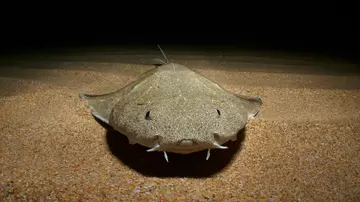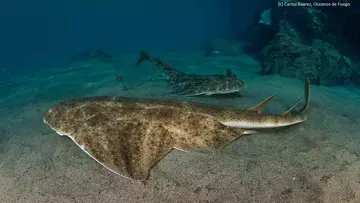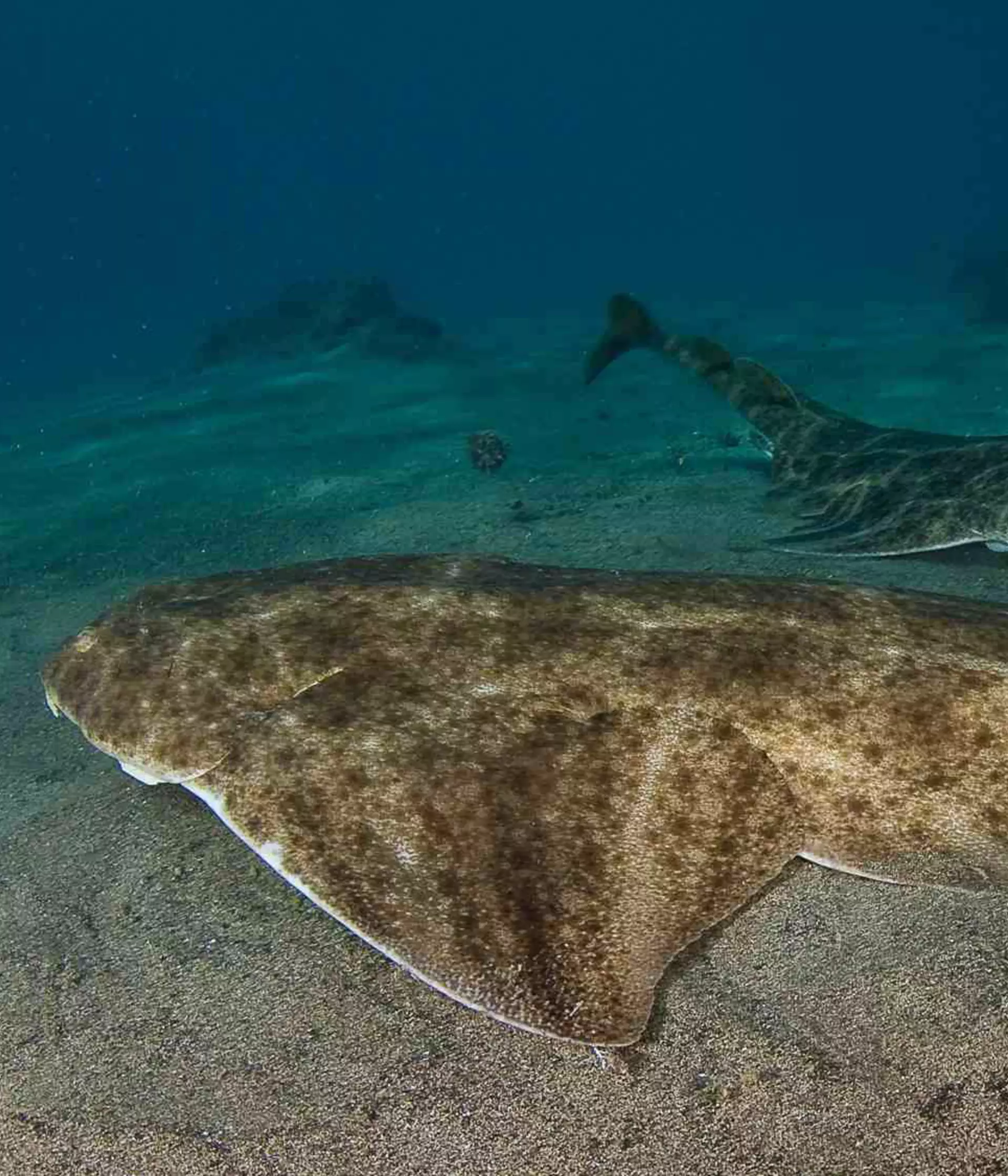
Did you know, the angel shark family (Squatinidae) is the second most threatened group of sharks and rays in the world?
On Shark Awareness Day, ZSL's Joanna Barker, Marine and Freshwater Project Manager, shares what it’s like to be part of a conservation project working to save the Critically Endangered Angelshark (Squatina squatina).

What are angel sharks?
Angel sharks are large, flat-bodied sharks that spend most of their time submerged in sediment, ready to ambush prey! There are three species found in the Eastern Atlantic and Mediterranean Sea, all of which are listed as Critically Endangered on the IUCN Red List and have disappeared from much of their historic range.
Today, the Canary Islands remain a unique stronghold for the Angelshark, with the species still being regularly sighted across the archipelago. This gives us hope that the species can be saved from extinction. However, it is under significant threat here too, for example from incidental catch in poorly-managed commercial and recreational fisheries; habitat degradation from pollution, coastal development and marine infrastructure; and disturbance by divers and beach users.
How are we working to protect angel sharks?
With a lack of detailed scientific information about their ecology, there has been little conservation attention on angel sharks to date. But through a collaborative approach, ZSL and a consortium of partners* are working to change this.
A couple of weeks ago we launched the Angel Shark Conservation Network, to bring together individuals and organisations to help deliver the objectives laid out in the Angelshark Action Plan for the Canary Islands and Eastern Atlantic and Mediterranean Angel Shark Conservation Strategy. In addition, we hope this will lead to using research techniques and information gathered in our Canary Islands project area to better protect remnant angel shark populations found in their wider range.
In 2014, the Universidad de Las Palmas de Gran Canaria, ZSL and Zoologisches Forschungsmuseum Alexander Koenig set up the Angel Shark Project (ASP) with the overall aim to safeguard the future of Critically Endangered angel sharks throughout their natural range. On World Oceans Day (8 June) this year, the project won the award for 'Outstanding Conservation Initiative' from Sociedad Atlántica de Oceanógrafos, which we were delighted with!

I've just returned from an expedition to the Canary Islands. During this trip we completed transect surveys in two potential Angelshark nursery areas. The surveys were completed at night when Angelsharks are more active and it is easier to find juvenile Angelsharks by torchlight (as their eyes reflect the light). One of our surveys was completed outside McDonalds in Puerto Colon to the latest Elvis Tribute Act playing at a nearby bar!
As well as the transect surveys, we completed a dedicated mark-recapture survey at Las Teresitas beach, just north of the capital of Tenerife. This beach is one of the busiest beaches on the island, used by thousands of people each day, but it is also the most important Angelshark nursery area we’ve discovered to date.
When the sun set, the Angel Shark Project team and a handful of keen volunteers scoured the shallow waters for juvenile Angelsharks. Any found were measured, weighed, tagged with visual ID tags and PIT tags and samples were taken for genetic analysis. Over three days we tagged 37 juvenile Angelsharks, providing vital data as part of our three-year study in this area.
The expedition wasn't only about fieldwork though. During the day, we used our time to meet with dive clubs and sport fisher charter boats across the islands. Working with the diving community is vital to better understand Angelshark distribution and ecology, as we ask all divers to submit their Angelshark sightings to our Angel Shark Sightings Map. Our work with sport fishers focuses on ensuring any Angelshark accidentally caught during their fishing trips are quickly released in the best condition to improve their chances of survival.
We would like to thank the Disney Conservation Fund, Save Our Seas Foundation, CRESSI and Deutsche Elasmobranchier-Gesellschaft for supporting the Angel Shark Project in 2017.
*Partners leading on angel shark conservation efforts in the region include the Angel Shark Project (Universidad de Las Palmas de Gran Canaria, Zoological Society of London & Zoologisches Forschungsmuseum Alexander Koenig), IUCN Shark Specialist Group, Shark Trust and SUBMON.
Climate change and human activity have pushed our precious planet to its limit, causing the devastating loss of so many habitats and species. From lab to field, hands on and behind the scenes, we’re leading the future of conservation, shaping agendas and influencing change to support better life, health and living for people and wildlife.
